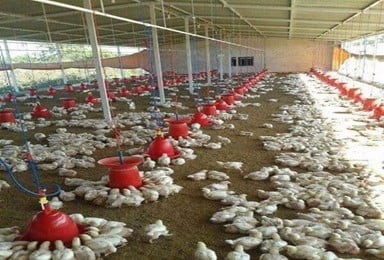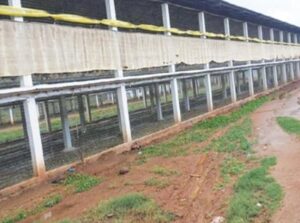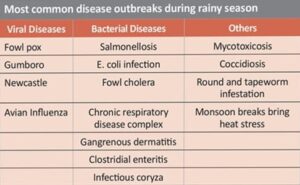TIPS TO POULTRY FARMER’S FOR FARM MANAGEMENT DURING MONSOON
The coming season is high humid temperature, in which more attention has to be given to feed nutrition along with farm management in the farm.
Every year from July to September southwest monsoon and from October to December northeast monsoon we are getting the rains. Because of the rains , the poultry farmers facing poultry disease problems. The litter and manure management become the key thing in commercial chicken rearing. The most important job in commercial poultry operations is the proper management of litter. If management is not effective, it can lead to suboptimum growth, mortality and production losses. During monsoon the temperature drops to ambient to cold and humidity increase. The low temperatures and high humidity make conditions very favourable for growth of disease causing pathogens and parasites.Hence, as a poultry farmer, it is very important to learn how to operate poultry farm during rainy seasons.
Litter is where the chickens spend all their life, in floor rearing system, from the time they are housed until they are marketed.Litter is the bedding for the birds and the material selected for this purpose should have qualities that make up to a good litter. Selecting a good litter material is the first right step! The litter should be highly absorbent, light in weight with medium or small particle size and dry rapidly. It should absorb effectively moisture, dilute the concentration of droppings, help insulate floor from the ground moisture and create a stimulus in the birds to scratch and dustbathe.
- Normally the ideal moisture content of the litter should be between 25% and 30%. If the moisture contents falls to say 20% the litter becomes too dusty, not good and if the moisture goes up to say 40% the litter gets wet and caked up, not good at all.
“If you are around any chicken rearing operations and happen to smell chicken manure, you actually smell mismanagement”
- More than 20 ppm of ammonia in the air close to the birds is bad news! Ammonia irritates the eyes and by inhalation it damages the inner lining of the respiratory tract of the birds exposing them to infections.
- Various materials such as wood shavings, cut sugar cane bagasse, hulls of cotton seed, soy bean and sunflower seed, crushed maize cobs, maize bran, chopped straw or chaff, dried leaves and grass, can all be used depending on the availability. Among these materials, wood shavings undoubtedly are considered as the best litter material.
- Properly stored dry litter material is spread rather thinly, say about 5cm thick on the floor before the chicks are placed. Fumigation is done with the litter spread on the floor.
Care should be taken to remove and dispose the litter after the grow- out so that the biosecurity precautions are observed strictly. Our main objective is to see that the littercontains the least number ofpathogenic organisms and that while disposing and no cross contamination at the farm takes place by wind or mechanical means.
- ‘Every creature’s waste is a priceless resource for some other creature’Properly kept and managed litter can be fed to cattle or used to fertilize the soil.
Management of poultry house in the rainy season
Repair the house before the arrival of the rainy season to clear the drainage ditch around the chicken house.
One should reserve enough dry padding. The thick padding should be turned over and keep the padding dry. The wet agglomerated padding should be cleaned out of the house.
Prevent the feed ingredients from getting wet, and the amount of feed should not be too much.The compound feed in the house should be placed on the platform above the ground to prevent the feed from regaining moisture.
How to manage the effects of rainy season in poultry farming.
- Reduction in the length of the daylight – During the rainy season, the daylight is reduced. This effect could be alleviated by providing florescent light.
- Chickens change their feeding habit –Chicken needs a high-energy diet during this period. Rich energy source such as fats , could be given in feed to meet their energy requirement.
- Moulting occurs during the rainy season –This phenomenon takes place at shorter days and cooler temperatures.
- Prevalence of Diseases –Rainy season favours poultry disease conditions a lot. It is a medium for transportation of pathogens; there are several outbreaks of poultry diseases during the rainy season.
Ensure you keep the pen dry always, do not serve caked feed; give antibiotics routinely during the rainy season to boost the chickens’ immune system.
The following diseases are prevalent during rainy season:
Most important poultry farming tips in rainy season
- Poultry feed must be available 4-5 days extra stock prior to your poultry farm specially during rainy season. Many farmers suffer around 10-50 % mortality in their poultry farm.
- Many time it also been observed rats made hole in roof and at time of rainy season leakage of water can make all litter wet. It cause ammonia & other disease like coccidiosis, which can cause huge lose to poultry farmers.The Lantern ( area outside roof ) of your poultry shed must be 4-5 feet ahead to shed to cover rain ( not to affect inside of poultry farm.)
- Keep checking the wind speed on your farm. In high humid condition, it is very important to use an anemometer (Available from Amazon for 1000-1200 INR) to check wind speed.
- If the humidity gets accumulated in the farm, the chances of respiratory disease are high in birds.
- Cinenol (Eucolyptus) + Menthol Give SA Broncho Dilators in water to be given in water in highly humid condition with natural betaine one time prevention
Dosing is as per veterinary consultant and by looking at the products composition of Cineole (Eucalyptus) & menthol contains commercially available in products
- After consulting your nutritionist in feed nutrition, the problem can be controlled by adding the following additives.
a.Green chillies in the feed are naturally high in vitamin A C K or B complex, Flavonoids, Capsaicin (8-methyl-N-vanillyl-6-nonenamide) which is very effective in heat stress and respiratory diseases, antiviral, antibacterial .
- Tamrind (Imali) which contains procyanidin is natural antioxidant which is very effective in coming IBH problem.
- Balance of electrolyte in feed especially potassium , Chloride , Sodium , sulphate which is very important for digestion along with cellular immunity. DEB or feed electrolyte changes according to the season by keeping in mind the temperature and humidity, its calculation is done , so before interfering in your Feed DEB do not forget to consult your nutritionist .
- Check Vitamin E in your feed premix Now commercial premix is focus on Maximum on premix AD3. vitamin E proper requirements can be used separately il on the advice of nutritionist if not available in premix properly.
- Use multiple toxin binders in toxin binder feed. T2, zearalenone toxin, is more of a problem in this season, in addition to aflatoxins.
- Pay attention to the titer of ND and IB, to control respiratory diseases.
- Avoid unnecessary use of any antibiotic without doing antibiotic sensitivity test with your veterinary consultant. Otherwise kidney and liver problems will remain in the farm. Which is the main reason for bird’s mortality nowadays.
- Keep the pH of shed water in 4.5 to 5 (except for vaccine and antibiotics treatment) so that the problem of any secondary bacterial infection like Ecoli and Salmonella is less.
In a nutshell, business in poultry farming is very lucrative and dynamic; hence, a good poultry farmer must be willing to manage the dynamics of poultry farming in rainy season to maintain a reasonable yield. The motto should be: ‘Give them comfort, Reap profit’.
Best Regards
Dr Bhaskar Choudhary
Animal Nutritionist
Area Manager Indians Subcontinent & West Africa -Biochem Germany





